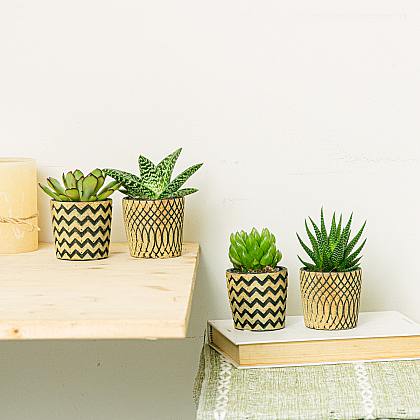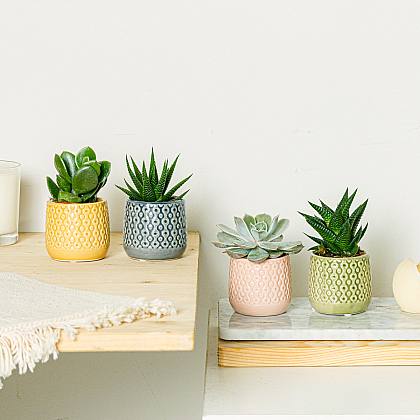Healthy growth made easy: tips for plant care
Proper plant care is crucial for healthy growth. In this article, we will look at various aspects of plant care, such as the importance of light and water, the...
Proper plant care is crucial for healthy growth. In this article, we will look at various aspects of plant care, such as the importance of light and water, the nutrients needed, and how to detect diseases and pests. We'll also discuss the best ways to control pests and diseases, as well as tips on how to optimally care for houseplants. If you're looking to make your garden or balcony bloom, you've come to the right place! Read on for valuable plant care tips.
Why proper plant care is so important
Proper plant care is crucial to ensure healthy growth and a successful harvest. There are many reasons why proper care is important. For one thing, plants can't grow well in poor conditions and are more susceptible to diseases and pests. Improper care can also lead to poor yield. On the other hand, plants that grow in optimal conditions can be healthier and contain more nutrients. Balanced care can also help plants become more resilient to environmental conditions such as drought or frost.
Good plant care starts with choosing the right location. Most plants need a lot of sunlight and water to thrive. Therefore, you should make sure that they receive enough light and water. Soil also plays an important role in the growth of plants. A well-drained soil with sufficient nutrients is ideal.
In addition, plants need to be watered regularly to ensure that they do not dry out. Fertilizers are also important to give plants the necessary nutrients they need for healthy growth. Finally, plants should be regularly inspected for signs of disease or pests in order to be able to act quickly.
Overall, it's important to understand that proper plant care doesn't have to be a complicated task. With a few simple steps, anyone can keep their plants healthy and ensure successful growth.
The importance of light and water for plant growth
Light and water are two of the most important factors in the growth of plants. Light enables photosynthesis, in which plants absorb carbon dioxide and produce oxygen. Without sufficient light, plants cannot grow and become weak. It's important to note that not all plants need the same amount of light. Some plants, such as succulents and cacti, require less light than other plants, such as tomatoes or roses. Therefore, it is important to learn about the specific needs of the plant and place it accordingly.
Water is another important factor in the growth of plants. It allows the transport of nutrients and minerals to the roots and other parts of the plant. Without enough water, plants can dry out and die. However, it's important to note that not all plants need the same amount of water. Some plants, such as cacti, require less water than other plants, such as ferns or lilies. Therefore, it is important to learn about the specific needs of the plant and water it accordingly.
It is also important to consider the quality of the water. Hard water can affect the pH of the soil and affect the growth of plants. If you have hard water, you may want to consider softening it or using distilled water.
Overall, light and water are essential for healthy plant growth. By educating yourself about the specific needs of each plant and meeting those needs, you can ensure that your plants thrive and stay healthy.
What nutrients do plants need for healthy growth?
Plants need various nutrients for healthy growth. The most important ones are nitrogen, phosphorus and potassium. Nitrogen is necessary for the formation of proteins and enzymes, which are essential for the growth of the plant. Phosphorus plays an important role in energy transfer in the plant and promotes root formation. Potassium strengthens cell walls and improves the plant's stress tolerance.
In addition to these three main nutrients, plants also need other essential minerals such as calcium, magnesium and sulfur. These contribute to the formation of chlorophyll, which is necessary for photosynthesis. Iron, zinc, and manganese are also important nutrients needed for the plant's growth.
To ensure that plants receive all the necessary nutrients, it is important to fertilize the soil regularly. Balanced fertilization ensures that the plants receive all the nutrients they need and can thus grow healthily. However, you should be careful not to fertilize too much, as this can lead to over-fertilization, which in turn is harmful to the plant.
In conclusion, plants need a balanced supply of all the necessary nutrients for healthy growth. Regular fertilization and healthy soil are of great importance here.
How to detect diseases and pests in plants
Diseases and pests can significantly affect the growth and health of your plants. It is important to identify these problems early in order to be able to act in time. Look for signs such as yellow or brown leaves, deformed flowers or stems, as well as the appearance of holes or spots on the leaves. These symptoms can indicate various diseases or pests. Another indication is sticky residues on the leaves, which may indicate an infestation of sucking insects such as aphids or spider mites. If you see small insects, such as aphids or thrips, on your plants, this is also an indication of a possible pest infestation. Also, watch out for any discoloration or changes to the roots of your plants, as this can indicate root rot. It is advisable to check your plants regularly to detect possible diseases or pests early on and thus protect the growth and health of your plants.
The Best Ways to Control Pests and Diseases
The best methods of controlling pests and diseases are crucial to ensure the healthy growth of your plants. If you notice that your plants are infested with pests, it is important to act quickly. An effective way to control pests is to apply natural insecticides such as neem oil or soapy water. These can be sprayed on the affected parts of the plant to kill the pests. Another option is to use beneficial insects such as ladybugs or parasitic wasps, which can control the pests and thus restore the ecological balance in your garden or on your balcony.
When fighting diseases, it is important to remove infected parts of the plant at an early stage to prevent further spread. It is also advisable to check the plants regularly for signs of disease, such as discoloration or spots on the leaves. In case of fungal infections, fungicidal sprays can be used to curb the growth of the fungi.
To prevent pests and diseases, you should take regular care of your plants and provide them with optimal growing conditions. This includes watering properly, avoiding over-fertilization, and providing adequate ventilation. Good hygiene is also important to prevent the spread of pathogens.
By using these best methods to control pests and diseases, you can ensure that your plants grow and thrive healthily. Keep in mind that regular monitoring and care of your plants is crucial to detecting and treating problems early.
Tips for optimal houseplant care
Optimal care of houseplants is crucial for their healthy growth and long-term beauty. Here are some tips that can help you take care of your houseplants:
1. Light: Make sure your houseplants get enough light. Place them near a window with indirect sunlight. However, be careful not to expose them to direct sunlight, as this can cause burns.
2. Water: Water your houseplants regularly, but avoid overwatering. Make sure the pot has a drainage hole to allow excess water to drain away. Feel the soil – if it's dry to the touch, it's time to water.
3. Fertilization: Give your houseplants regular nutrients to promote their healthy growth. Use a special houseplant fertilizer and follow the instructions on the package.
4. Humidity: Some houseplants require higher humidity levels than others. Spray the leaves regularly with water or place the plants on a tray filled with water to increase the humidity.
5. Repotting: Regularly check to see if your houseplants have grown larger and need to be repotted into a larger pot. Make sure the new pot has enough drainage holes and use fresh potting soil.
With these simple tips, you can ensure that your houseplants are optimally cared for and will give you pleasure for a long time.
How to make your garden or balcony bloom
To make your garden or balcony bloom, there are some tips that can help you with this. First of all, it's important to choose the right plants for your location. Make sure the plants get the right amount of sunlight and that the soil can retain enough water. Regular watering is essential, especially during dry periods. However, be careful not to overwater your plants, as this can lead to root rot. Regularly removing weeds and mulching around the plants will also help keep the soil moist and encourage growth. In addition, you can use fertilizer to provide your plants with the nutrients they need. However, keep in mind the needs of each plant species, as not all of them need the same fertilizer. Finally, you should regularly keep an eye out for diseases and pests. If you notice signs of pest infestation or disease, you should act quickly and take appropriate measures to control it. By following these simple tips, you can turn your garden or balcony into a blooming paradise and get the most out of your plants.
I hope this article has helped you improve your plant care and promote healthy growth. It's important to understand the importance of light, water, and nutrients to the growth of your plants, and to detect diseases and pests early. With the right methods, you can combat these problems and make your garden or balcony bloom. Remember that caring for plants is a rewarding and calming activity that connects us to nature. In our hectic world, it can be a way to reduce stress and create a sense of calm and peace. You may want to think about how you can spend more time outdoors and grow your own plants. How can we, as a society, place more emphasis on being close to nature and protect our planet? Let's think about it and act together


